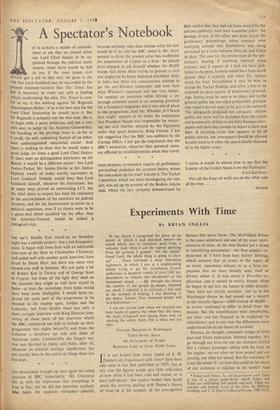DOES READING NEWSPAPER reports of preliminary proceedings prejudice the jurymen
before whom the case comes up for trial? I doubt it. The Tucker Committee, which has been investigating the sub- ject, was set up on account of the Bodkin Adams case, where the jury certainly demonstrated by their verdict that they had not been swayed by the advance publicity. And there is another point : the damage, if any, in this affair was done before the preliminary proceedings, when rumours were scurrying around that Eastbourne was being terrorised by a cross between Dracula and Gilles de Rais. The case for the prosecution at the pre- liminary hearing if anything restored some balance; and if reports of it had not been pub- lished in the press, hysteria would have been much greater than it actually was when Dr. Adams stood his trial. Nevertheless it may be wise to accept the Tucker findings, and allow a ban to be imposed on press reports of preliminary proceed- ings. Justice must be seen to be done; and to the general public the one-sided preliminary proceed- ings reports do not seem to be just to the accused. The safeguards proposed are adequate : neither public nor press will be excluded from the courts and presumably if there is any fishy business news- papers will have the courage to report it there and then. If anything arises that appears to be of public interest, too, newspapers should be allowed to refer back to it when the case is finally disposed of in the higher court.






























 Previous page
Previous page